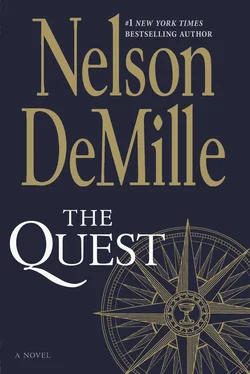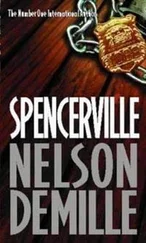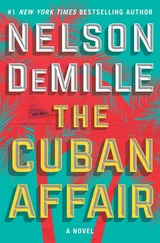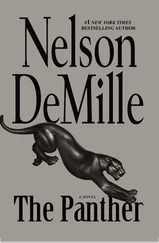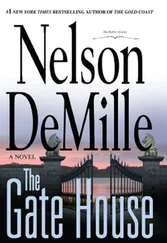Nelson Demille - The Quest
Здесь есть возможность читать онлайн «Nelson Demille - The Quest» весь текст электронной книги совершенно бесплатно (целиком полную версию без сокращений). В некоторых случаях можно слушать аудио, скачать через торрент в формате fb2 и присутствует краткое содержание. Год выпуска: 2013, ISBN: 2013, Издательство: Center Street, Жанр: Триллер, на английском языке. Описание произведения, (предисловие) а так же отзывы посетителей доступны на портале библиотеки ЛибКат.
- Название:The Quest
- Автор:
- Издательство:Center Street
- Жанр:
- Год:2013
- ISBN:1455576425
- Рейтинг книги:5 / 5. Голосов: 1
-
Избранное:Добавить в избранное
- Отзывы:
-
Ваша оценка:
- 100
- 1
- 2
- 3
- 4
- 5
The Quest: краткое содержание, описание и аннотация
Предлагаем к чтению аннотацию, описание, краткое содержание или предисловие (зависит от того, что написал сам автор книги «The Quest»). Если вы не нашли необходимую информацию о книге — напишите в комментариях, мы постараемся отыскать её.
The Quest — читать онлайн бесплатно полную книгу (весь текст) целиком
Ниже представлен текст книги, разбитый по страницам. Система сохранения места последней прочитанной страницы, позволяет с удобством читать онлайн бесплатно книгу «The Quest», без необходимости каждый раз заново искать на чём Вы остановились. Поставьте закладку, и сможете в любой момент перейти на страницу, на которой закончили чтение.
Интервал:
Закладка:
Nelson Demille
The Quest
PART I
“What is it?
The phantom of a Cup which comes and goes?”
“Nay, monk! What phantom?” answered Perceval.
“The Cup, the Cup itself, from which our Lord
Drank at the last sad supper with his own.
This, from the blessed land of Aromat…
Arimathaean Joseph, journeying brought
To Glastonbury…
And there awhile it bode; and if a man
Could touch or see it, he was heal’d at once,
By faith, of all his ills. But then the times
Grew to such evil that the Holy Cup
Was caught away to Heaven and disappear’d.”
— Alfred, Lord Tennyson, “The Holy Grail”Chapter 1
The elderly Italian priest crouched in the corner of his cell and covered himself with his straw pallet. Outside, screaming artillery shells exploded into the soft African earth, and shrapnel splattered off the stone walls of his prison. Now and then, a shell air-burst overhead and hot metal shards pierced the corrugated metal roof.
The old priest curled into a tighter ball and drew the pitifully thin pallet closer. The shelling stopped abruptly. The old man relaxed. He called out to his jailers, in Italian, “Why are they bombing us? Who is doing this thing?”
But he received no answer. The older Ethiopians, the ones who spoke Italian, had gradually disappeared over the years, and he heard less and less of his native tongue through the stone walls. In fact, he realized he hadn’t heard a word of it in almost five years. He shouted in snatches of Amharic, then Tigregna. “What is it? What is happening?” But there was no answer. They never answered him. To them, he was more dead than the ripening bodies that lay in the courtyard. When you ask questions for forty years and no one answers, it can only mean that you are dead. But he knew they dared not answer. One had answered, once, when he first entered his cell. Was it forty years now? Perhaps it was less. The years were hard to follow. He could not even remember the man who had answered, except for the skull. His jailers had given him the skull of the one who had answered him. The skull was his cup. He remembered the man and his kindness each time he drank. And the jailers remembered when they filled his cup; they remembered not to speak to him. But he asked anyway. He called out again. “Why is there war? Will you release me?”
He stared at the iron door on the far wall. It had closed on a young man in 1936, when Ethiopia was an Italian colony, and the door had not opened since. Only the small pass-through at the bottom of the iron door was ever used. His sustenance came in and his waste went out once a day through that small portal. A window, no larger than a big book-really just a missing stone-above eye level, let in light, sounds, and air.
His only possessions in the cell, aside from his tattered shamma , were a washbasin, a pair of dull scissors that he used to cut his hair and nails, and a Holy Bible, written in Italian, which they had let him keep when he was first imprisoned. If it weren’t for his Bible, he knew, he would have gone mad many years ago. He had read the holy book perhaps a hundred, two hundred times, and though his eyesight was growing weaker, he knew every word by heart. The Old and New Testaments brought him comfort and escape, and kept his mind from dying, and kept his soul nourished.
The old man thought of the young man who walked through the iron door in 1936. He knew every detail of the young man’s face and every movement of his body. At night, he spoke to the young man and asked him many things about their native Sicily. And he knew the young man so well that he even knew what went on inside his mind and how he felt and where he went to school and the village he came from and how old his father was. The young man never got older, of course, and his stories were always the same. But his was the only face the old man knew well enough to remember. He had seen that young face in the mirror for the last time close to forty years ago and not again since, except in his mind’s eye. He wept.
The old priest dried his tears on his dirty native shamma and lay back against his cell wall and breathed deeply. His mind eventually came back to the present.
Wars had ebbed and flowed around his small prison and he imagined that the world had changed considerably in his absence from it. Jailers got old and died. Young soldiers grew old as they paraded through the years in the courtyard of the small fortress outside. When he was younger, he was able to hang from the sill of the window much longer. But now he could no longer gather the energy to pull himself up for more than a few minutes a day.
The shelling had jarred loose many things in his mind. He knew that his imprisonment was at its end; if the explosions did not kill him, then the guards would, because he knew they had standing orders to kill him if they could no longer continue to guarantee his incarceration in this place. And now he could hear the sounds of fleeing garrison soldiers. And the jailers would soon open that never-opened door and do their duty. But he held nothing against them. Those were their orders and he forgave them. But it did not matter if they or the explosions killed him. His own body was failing him anyway. He was dying. There was famine in the land and the food had been poor for over a year. His lungs made a liquid sound when he coughed. Death was here. Inside his cell and outside his cell.
The old man’s biggest regret, he thought, was that he would die in ignorance-that as a consequence of the two score years of being held in darkness, he knew less than the simplest peasant did about his world. He did not regret the dying-that held no special terror for him-but the thought of dying without knowing what the world had come to in his absence was a peculiarly sad thing. But then again, his calling was not of this world, but of the next, and it should have made no difference what the world had come to. Still, it would have been nice to know just a little something of the affairs of men. He could not help wondering about his friends, about his family, about the world leaders of his day.
He wrapped the shamma around himself more tightly. The sun was fading from his window and a chill wind blew down from the highlands. A small lizard, its tail partly severed by a piece of shrapnel, climbed awkwardly up the wall near his head. Outside in the stillness, he could hear the soldiers speaking in Amharic about who would have to kill him if it became necessary.
Like so many other imprisoned and condemned men and women, like the martyred saints, the thing that had sustained him through his ordeal was the very thing that had condemned him in the first place. And what had condemned him was his knowledge of a secret thing. And the knowledge of that secret thing comforted him and nourished him and he would gladly have traded forty more years of his life, if he had them to trade, for one more look at the thing that he had seen. Such was his faith. The years in prison saddened him because they meant that the world had not yet learned of this thing. For if the world knew, then there would be no more reason for his solitary confinement.
He often wished they had killed him then, and spared him this living death for forty years. But he was a priest, and those who had captured him, the monks, and those who had imprisoned him, the soldiers of the emperor, were Coptic Christians, and so they had spared his life. But the monks had warned the soldiers never to speak to the priest, for any reason, or death would come to them. The monks had also told the soldiers that they had leave to kill the priest if his imprisonment and silence could not be guaranteed. And now, he thought, that day had surely come. And he welcomed it. He would soon be with his heavenly father.
Читать дальшеИнтервал:
Закладка:
Похожие книги на «The Quest»
Представляем Вашему вниманию похожие книги на «The Quest» списком для выбора. Мы отобрали схожую по названию и смыслу литературу в надежде предоставить читателям больше вариантов отыскать новые, интересные, ещё непрочитанные произведения.
Обсуждение, отзывы о книге «The Quest» и просто собственные мнения читателей. Оставьте ваши комментарии, напишите, что Вы думаете о произведении, его смысле или главных героях. Укажите что конкретно понравилось, а что нет, и почему Вы так считаете.
